By Maggie Swofford, Marketing & Editorial Assistant
Miss Wentworth was talking again as she stacked the plates, though more to herself than him.
“Sometimes I wonder if the inherited weaknesses for which we are not responsible do not cause more trouble to ourselves and others than the sins for which we are responsible,” she said sadly.
Michael, filling her hot water bottle as though he had been doing it every day of his life for ten years, flinched but longed to comfort her. “Trouble, perhaps, but not injury,” he said slowly. “I mean, you may cause others a spot of bother by your weaknesses, perhaps, but coping with you may possibly increase their strength and sympathy. But if you sin deliberately, even if it seems only against yourself—well—you won’t be the only one to suffer. You may even be the one who suffers least.”
 The day to celebrate Elizabeth Goudge has come ‘round again, and I’m pleased to bring before you The Rosemary Tree, a book so attentive and gentle to the human condition that it’s (painfully) easy to find pieces of yourself scattered throughout the minds of her ever-realistic characters. The Rosemary Tree is the story of the Wentworth family in the aftermath of World War II, specifically John Wentworth—vicar of a church in Devon, England—and his wife, Daphne, who feels trapped in the vicarage. While John’s great aunt Maria lives in the dilapidated family manor house, their three daughters attend a dysfunctional school, captive among embattled staff and their wretched headmistress. It is only Harriet, John’s aging former nanny, who holds the family together through her love and empathy. But when Michael Stone returns to town, recently released from prison and Daphne’s ex-fiancé, he is a disruption to the lives of all—including his own—freeing them from their prisons, both physical and metaphorical.
The day to celebrate Elizabeth Goudge has come ‘round again, and I’m pleased to bring before you The Rosemary Tree, a book so attentive and gentle to the human condition that it’s (painfully) easy to find pieces of yourself scattered throughout the minds of her ever-realistic characters. The Rosemary Tree is the story of the Wentworth family in the aftermath of World War II, specifically John Wentworth—vicar of a church in Devon, England—and his wife, Daphne, who feels trapped in the vicarage. While John’s great aunt Maria lives in the dilapidated family manor house, their three daughters attend a dysfunctional school, captive among embattled staff and their wretched headmistress. It is only Harriet, John’s aging former nanny, who holds the family together through her love and empathy. But when Michael Stone returns to town, recently released from prison and Daphne’s ex-fiancé, he is a disruption to the lives of all—including his own—freeing them from their prisons, both physical and metaphorical.
What It Means to Be Flawed
As the previous quote demonstrates, Goudge spends some particularly intentional time in this novel thinking about what it means to be flawed human beings. While it’s normal to sin (e.g., lie, cheat, etc.), a couple of her main characters battle with more subtle flaws of just being alive—little personality traits and idiosyncrasies that make being someone’s friend or family member, no matter how much you love and care for them, difficult at times.
In The Rosemary Tree, John Wentworth struggles with intense self-doubt and, frankly, self-hatred. Unfortunately for him, this is a result of his severe self-awareness. As the town vicar, as well as a man who grew up in the community, he feels as though everyone knows his flaws and thus barely tolerates him in his position as priest. He constantly struggles with his natural self, making the same mistakes despite his best attempts to do otherwise. For him, this looks like: forgetting to come to dinner when Daphne prepares a particularly special meal; forgetting to get the flowers Daphne requested; accidentally dropping and shattering her favorite teacup; and sometimes lacking the courage to put his foot down when the situation calls for it. The worst part of all these simple but constant blunders is that he’s entirely aware of them—and longs to change. But no matter how many knots he makes in his handkerchief, how hard he tries to be better, or how many times he mentally berates himself, he naturally reverts back to the habits of his personality.
Surrounded by Reminders of How God Sees Us
This year, the idea of identity and self-awareness seem particularly significant to me. Similar to John, it’s normal for all of us to have moments of despair when we feel ourselves slipping once again into personality traits that seem to unintentionally hurt others or keep us from being able to do our best. What I appreciate about the following excerpt, though, is Goudge’s thoughtful optimism and unique perspective. Instead of leaving John in his dark corner of self-hatred, she strategically places people around him who, whether he knows it or not, are completely and fully aware of who he is and what he does, and they appreciate him anyways. In that same way, I’d like to think that God inserts people into our lives who, without our asking or even our approval, love us and stick around even when we’re having our worst moments. Those people are often the reason we are eventually able to see ourselves as God does: beautiful, full of hope, and bursting with possibilities of doing good with our lives despite our shortcomings.
John’s Unbeknownst Forgiveness and Acceptance
Representing one occasion where John is presented with a moment of forgiveness and acceptance (even though he’s not physically present) is the following excerpt. Here, John just gave away a nearly empty flask of brandy to old Bob, his groundskeeper, when he had meant to give him a full flask. Earlier in the day, John came across another man in need who drank most of the brandy. In the below passage, John realizes that he forgot to refill the flask, and thus gives in to his typical self-flagellation. However, old Bob is filled with love and appreciation for John. As someone who has known him all his life, old Bob finds John’s mistake to be endearing—it is an example of stability; John will always be himself, which is comforting and reassuring to Bob because of the ever-fluctuating nature of his own life.
John got himself clumsily out of the room, catching his foot in the rag rug this time, and out of the dark little house into the cool spring evening.
“Now I’m here I must go and see Aunt Maria,” he thought. “If I don’t she might be hurt if she hears I was at the lodge. But I must hurry or I’ll be late for supper, and that will hurt Daphne.”
He toiled up the steep drive through the beeches as quickly as he could, but just opposite the archway with the escutcheon of his family he stopped, suddenly remembering that the man he had met on the road this morning had drunk most of the brandy. Fool! Ass! Bungling ass! Criminal fool! Shame seized him, abysmal bitterness and shame. He had little sense of proportion and all his failings ranked as crimes in his eyes. He turned and ran down the hill again, but before he reached old Bob’s door he stopped, halted miserably and uncertainly and then turned back up the hill once more. For what was the good? How could he explain what had happened? It was such a mixed up story. The fool that he was could never get it disentangled. If he tried he would probably only hurt the poor old chap still further, better let it be. What a bad priest he was. Priests needed wisdom and tact and he had neither. Such bungling as his could lose a soul. The unspeakably precious soul. He should never have been a priest. He pulled his hair shirt about him and toiled on wretchedly up the hill. He should never have been a priest. Only God knew how many souls were lost because he was one. Only God knew.
Inside the lodge Bob was enjoying the best laugh he had had in weeks. Proper tootlish the vicar was. Left it about careless like, and someone had taken a nip. Just like Master John. His mind slipped suddenly back into the past and a happy old memory came to him. He stopped laughing and smiled with infinite tenderness. Yes, just like that, just the same. He remembered it as though it were yesterday.
It had been Bob’s birthday and John, seven or eight years old at the time, had saved up his pocket money and bought him a packet of cigarettes. But on his way through the kitchen garden to the stableyard to present them he had remembered that he had forgotten to give his kitten her milk, and had put the cigarettes under the rhubarb while he ran back to Tibby. A half-witted garden boy had been weeding in the garden at the time, and when a couple of hours later he suddenly remembered the cigarettes, fetched the packet and presented it to Bob, all had been filched but two. Poor little chap, how he had cried! Tootlish even then. But Bob had laughed and tweaked his hair and vowed that what was left was—what had been his phrase?—“worth more to me from you, Master John, than a box of cigars at five quid a box from the King of England himself.” That had comforted the little chap but he had not been able to laugh about it. Too tender-hearted. Always had been. Always the same.
The memory passed and he drank off what was left of the brandy, laughing again. “Done me a power of good,” he chuckled, looking at the empty flask. “That’s Master John all over. He don’t change. Always the same.”
He became silent, thinking back over the years once more. “Always the same.” The countryman has no higher praise to bestow. “He’ll see me out, thank God,” thought old Bob, and comforting himself with that thought and the warmth of the brandy he presently fell asleep.
In those moments when we are miserable because of our failures, let us remember that they may not be as bad as they seem, and that it is often a result of our imperfect behavior and individualities that others are drawn to us and care for us. When you’re tempted to slip into self-hatred, as I so often do, it may be worth it for us to remember that nothing is irreparable to God, and even our foulest inadequacies can make someone dear to us break into laughter.
Did this snippet whet your appetite for more? If so, feel free to click on the below cover images or peruse our website for more about Elizabeth Goudge and her novels.
Maggie Swofford is a marketing and editorial assistant at Hendrickson Publishers. She graduated summa cum laude with honors from Gordon College with a BA in English Language and Literature. She has been published in Fathom magazine, Mazing magazine, Rantoul magazine, and The Idiom. For more information, visit her website: www.maggieswofford.wordpress.com.
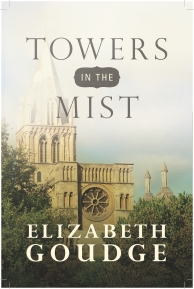

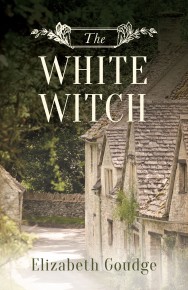
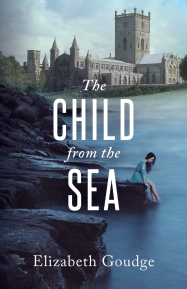

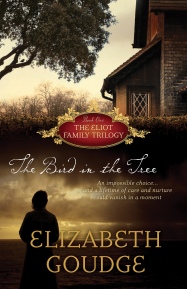
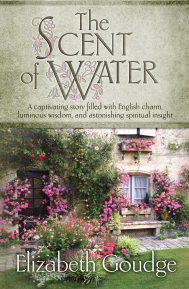
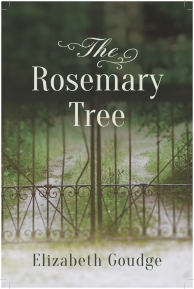
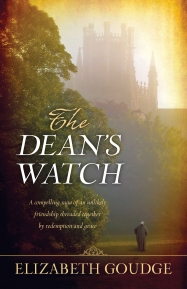
Reblogged this on Maggie Swofford and commented:
It’s such a treat to get to share some Elizabeth Goudge with everyone each year. The Rosemary Tree is one of my favorites, now that I’ve finished it. I started it off thinking, “Wow, these characters are all pretty annoying and have so many issues.” But as it went on, I realized that Elizabeth had purposefully written them like that because she knows that all humans, including us, are like that. Books like this one are the reason I adore fiction: you start off thinking that the characters/plots are completely outside of you and your life, but then you realize that they’re really not—you can learn so much from fictional characters, and find pieces of yourself in them that you might have a hard time seeing or identifying otherwise.
I hope you enjoy this little snippet.
LikeLike